Yesterday, we were discussing Thanksgiving travel plans, and it reminded me of Thanksgiving last year. I always torture my family by announcing that I will, of course, make my annual Thanksgiving speech as we sit down to eat. I’m referring to a somewhat tongue in cheek speechlet about Thanksgiving being a celebration of the Indian’s big mistake by showing up with food rather than warpaint. Maybe they would still have their land. It’s kind of a ritual. I announce my speech, they all groan, I shut up, and we eat. But last year at Thanksgiving, I was thinking seriously about what we had to be thankful for. I was, of course, thrilled about the election. Ding Dong, the Wicked Witch is dead! But, like everyone else, I was troubled. The Stock Market had fallen. Bush had thrown a trillion dollars at the Banks. I’d spent hours reading about things like Derivatives, credit default swaps, cdo’s, and everything I could find about economics and the business cycle. What I read wasn’t good – not even slightly encouraging. And this graph was the most ominous piece of it all.

The Consumer Price Index is an odd statistic. It’s the current cost of a standardized set of goods. It hardly seems like something that would be possible to measure, but they measure it every month, and it’s apparently pretty accurate. In newspaper article terms, it’s usually described as "inflation," the tendency of the cost of everything to go up slowly over time. When I figured out how to look at it on the Internet [the
Bureau of Labor Statistics among other places], it’s a remarkably stable line. Though the slope of the rise varies slightly, it just keeps on marching upward. When I looked at it this time last year, it was alarming. In September, it flattened, then abruptly headed south. It hadn’t done anything like that since 1929. Like a lot of people, I started reading about what such a thing meant. It’s called a
Deflationary Spiral:
A deflationary spiral is a situation where decreases in price lead to lower production, which in turn leads to lower wages and demand, which leads to further decreases in price. Since reductions in general price level are called deflation, a deflationary spiral is when reductions in price lead to a vicious circle, where a problem exacerbates its own cause.
It’s the hallmark of financial panic. People become afraid that the economy is crumbling and they’re going to get stuck with their inventory, so they start selling things off at lower prices. They stop stocking their shelves, so suppliers cut production [and jobs]. Customers stop spending as the panic escalates and it begins to feed on itself. It doesn’t happen in the usual Recessions – the so called "business cycle." In fact, the Stock Market doesn’t take big dives in a garden variety Recession. Usually, the Gross Domestic Product [gdp] falls some and unemployment rises. That goes on for a time, then things recover. This one was different, unique over my whole lifetime.
The cpi is an interesting statistic, because it’s really a psychological measurement – it measures something like group fear. And by this account, we were really terrified. It leveled off in the late summer, then began to fall like a brick. By
Thanksgiving, all I could think of to be thankful for was the future. Reflecting back on it yesterday, it reminded me of the Thanksgiving seven years before. The Twin Trade Towers in New York had been toppled by a band of misanthropic religious fanatics from the deserts of Afghanistan, people I’d personally never even heard of. We now know that there was plenty of warning, but it had been ignored. President Clinton knew about it. He’d sent missiles into Afghanistan trying to hit their leader – Osama Bin Laden. Our Counter-Terrorism Czar, Richard Clarke, sure knew about it. He’d sent endless Memos and talked to our new leaders more than enough in their first eight months:
At a July 5, 2001 White House gathering of the FAA, the Coast Guard, the FBI, Secret Service and INS, Clarke stated that "Something really spectacular is going to happen here, and it’s going to happen soon." Donald Kerrick, a three-star general who was a deputy National Security Advisor in the late Clinton administration and stayed on into the Bush administration, wrote Hadley a classified two-page memo stating that the NSA needed to "pay attention to Al-Qaida and counterterrorism" and that the U.S. would be "struck again." As a result of writing that memo, he was not invited to any more meetings. On August 6, 2001, Clarke finally delivered a Daily Briefing Memo to President Bush entitled Bin Laden determined to attack inside the United States, five weeks before the attacks. It featured information about ongoing Al-Qaeda activities within the United States, signs of a terror support network, indications of hijacking preparations and plans for domestic attacks using explosives.
These parallels are striking to me, like parentheses bracketing a perfectly dreadful period in American history by any measurement. 9/11 fell on us out of the blue, or so we thought. But that’s not right. We knew plenty and ignored it. The financial crisis last year seemed to come out of the blue too, but the warning signs were deafening: a tanking real estate market after the "housing bubble" burst, Freddy Mac and Fannie Mae collapsing along with it; a declining DOW Jones average; soaring oil prices – yet another "bubble." While President Bush obsessed about what to do with his deteriorating wars in the Middle East focusing on his beloved "surge," our economy was in its last throes before heading for a cellar potentially mirroring the "big one" from eighty years before. What did we hear about the economy? "The fundamentals are sound." But they weren’t sound after all. As I thought of these parallels, the
words of Dick Cheney from last week’s speech kept coming into my mind:
Last January 20th, our successors in office were given the highest honors that the voters of this country can give any two citizens. Along with that, George W. Bush and I handed the new president and vice president both a record of success in the war on terror, and the policies to continue that record and ultimately prevail. We had been the decision makers, but those seven years, four months, and nine days without another 9/11 or worse, were a combined achievement: a credit to all who serve in the defense of America, including some of the finest people I’ve ever met.
I was sitting on my back porch looking at a perfectly beautiful Fall day, and I found myself talking to Mr. Cheney in the world of my imagination.
"Yeah, when you and George Junior took office, you set out on an agenda left over from your days as his father’s Secretary of Defense, ignoring the very real threat from the present. After 9/11, instead of responding to this real problem you had ignored, you still stuck to your anachronistic agenda and invaded Iraq, giving too little attention to the Afghanistan War and the hunt for al Qaeda. Meanwhile, you two did nothing I can see to address the the financial catastrophe that grew and festered right under your noses until it exploded like the Twin Towers and fell down around us. And you want gratitude?"
Here’s the kind of truth Cheney should have spoken last week [Richard Clarke’s
introduction to his March 2004 appearance in front of the 9/11 Commission]:
"To the loved ones of the victims of 9/11, to them who are here in this room, to those who are watching on television, your government failed you. Those entrusted with protecting you failed you. And I failed you. We tried hard, but that doesn’t matter because we failed. And for that failure, I would ask, once all the facts are out, for your understanding and for your forgiveness."
So why did the cpi, the measure of our fear, turn around and fall back into line? It wasn’t just
TARP [Bush’s Bank bailout]. That passed on October 3, 2008 and the cpi kept falling. And it wasn’t
ARRA [Obama’s Stimulus Package]. That didn’t pass until February 17, 2009, several months after the cpi turned back north. The answer is pretty obvious. It’s the same reason the Nobel Committee gave Obama the
Nobel Peace Prize. At long last, America was back in the hands of a competent person, a person of integrity. Being Barack Obama as President is really hard work. Out of our terror, we gave George W. Bush a Bye for much of his first term. Not so for Obama, who has the Augean Stables to clean up against an avalanche of conservative and racial hatred. I doubt he’ll be able to be the great President he was born to be with all the obstacles in his path [though maybe surviving in this toxic environment is, in fact, greatness in and of itself]. But what he’s done and what he’s doing are way good enough for me.
This Thanksgiving, I know what I’ll be thankful for. This time, it has already happened…
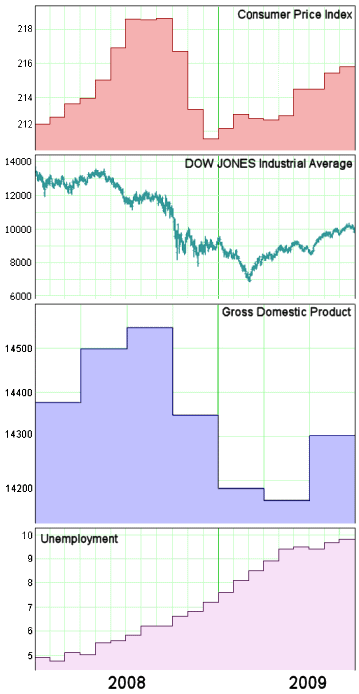
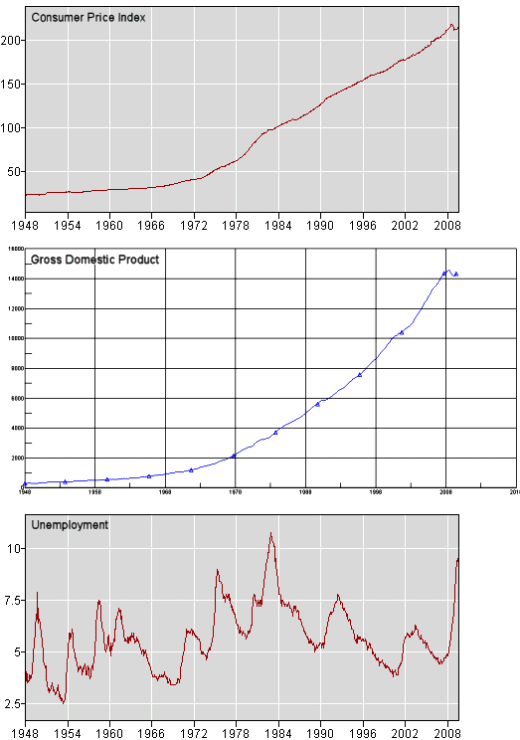

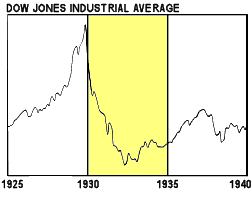
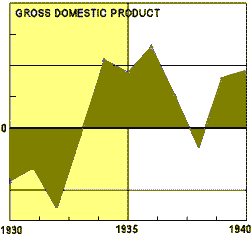



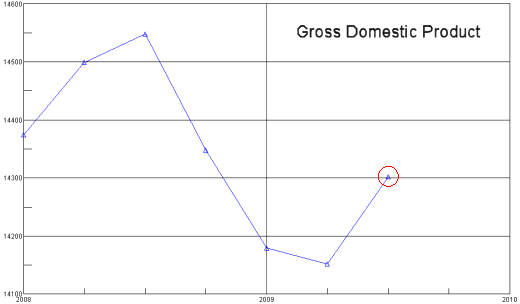




 All that aside, this was a sterling accomplishment, Obama’s paring back spending on a lot of unnecessary and exotic weaponry. Reagan, the Bushes, and the neoconservatives pursued a foreign policy that would position us as the military enforcer for the entire world. I don’t think we want to do that [or pay for it]. I’m not sure we ever did. The Republicans that followed Eisenhower never listened to him. I’m glad someone is finally trying to heed his warnings.
All that aside, this was a sterling accomplishment, Obama’s paring back spending on a lot of unnecessary and exotic weaponry. Reagan, the Bushes, and the neoconservatives pursued a foreign policy that would position us as the military enforcer for the entire world. I don’t think we want to do that [or pay for it]. I’m not sure we ever did. The Republicans that followed Eisenhower never listened to him. I’m glad someone is finally trying to heed his warnings.
 “That is an example of a failure to notify but we think a symptom of a larger disease,” Schakowsky said on Tuesday. “There have been many instances where we’ve come to a committee hearing, after having read in the paper of something that should have been notified to us, where it’s followed up my mea culpas by the intelligence community,” Schakowsky said. “And examples where the committee actually has been lied to.” “You can understand that the committee has felt very frustrated that the executive branch has not notified us of intelligence activity,” she said. “We’re in the process of reviewing several instances where the executive branch may have violated the [notification] requirements that are in the National Security Act.”
“That is an example of a failure to notify but we think a symptom of a larger disease,” Schakowsky said on Tuesday. “There have been many instances where we’ve come to a committee hearing, after having read in the paper of something that should have been notified to us, where it’s followed up my mea culpas by the intelligence community,” Schakowsky said. “And examples where the committee actually has been lied to.” “You can understand that the committee has felt very frustrated that the executive branch has not notified us of intelligence activity,” she said. “We’re in the process of reviewing several instances where the executive branch may have violated the [notification] requirements that are in the National Security Act.”

 What Joe Lieberman wants, in all probability, is attention. He wants Harry Reid to have to stand up and
What Joe Lieberman wants, in all probability, is attention. He wants Harry Reid to have to stand up and  Nate’s right. Lieberman is like one of those Roman Senators in the old movies like The Gladiator or Julius Caesar – plotting and scheming for power, or glory, or revenge, or attention, or envy, or who-knows-what that doesn’t have anything to do with the issue on the table. He’s having his moment in the sun being oh-so-very important like he did with his pal John McCain during the campaign. Obama should’ve picked him for VP when McCain didn’t to get him out of the Senate. Then he could’ve just ignored him for four years. Whatever Joe’s up to, it’s kibitzing and grandstanding that runs his motor. I hope he enjoys himself.
Nate’s right. Lieberman is like one of those Roman Senators in the old movies like The Gladiator or Julius Caesar – plotting and scheming for power, or glory, or revenge, or attention, or envy, or who-knows-what that doesn’t have anything to do with the issue on the table. He’s having his moment in the sun being oh-so-very important like he did with his pal John McCain during the campaign. Obama should’ve picked him for VP when McCain didn’t to get him out of the Senate. Then he could’ve just ignored him for four years. Whatever Joe’s up to, it’s kibitzing and grandstanding that runs his motor. I hope he enjoys himself. As for me, the Lieberman announcement got me kind of down. It rained all day here with a high, cold wind, so I had to much time to think. It was like last time, Bush days, when some ploy like Lieberman’s went on all the time. We never know the real story, so we spent all our time guessing about the back story. And here we go again. What does Lieberman want? Indeed. Lieberman is hardly the point. As Nate points out, his objections make little sense. The most I can make of what he said is that he doesn’t want to vote for it because he doesn’t want to vote for it. And what of his constituents? "Connecticutians favor the public option 64-31."
As for me, the Lieberman announcement got me kind of down. It rained all day here with a high, cold wind, so I had to much time to think. It was like last time, Bush days, when some ploy like Lieberman’s went on all the time. We never know the real story, so we spent all our time guessing about the back story. And here we go again. What does Lieberman want? Indeed. Lieberman is hardly the point. As Nate points out, his objections make little sense. The most I can make of what he said is that he doesn’t want to vote for it because he doesn’t want to vote for it. And what of his constituents? "Connecticutians favor the public option 64-31."